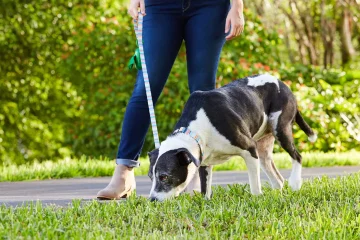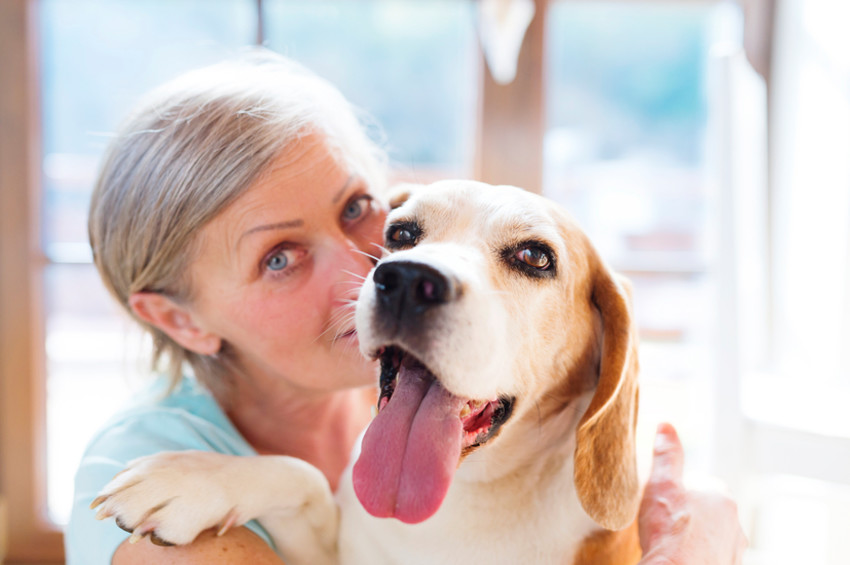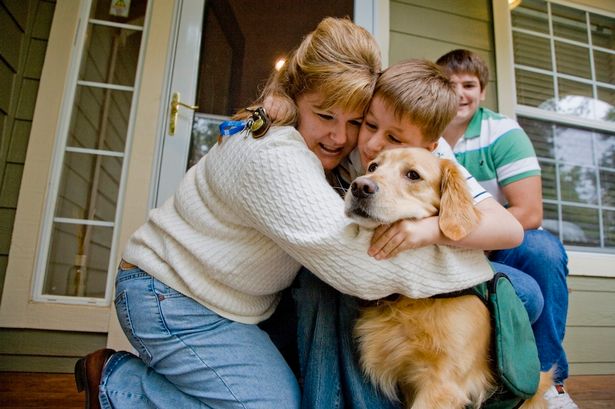The Extraordinary Connection Between Dogs and Humans: Exploring the Unbreakable Bond

Dogs have held the title of “man’s best friend” for centuries, a phrase that underscores the extraordinary relationship between humans and these loyal, intelligent creatures. From their earliest days as wild hunters to their modern roles as companions, working animals, and emotional support, dogs have evolved alongside humans in a partnership that is deeply rooted in history and rich in emotional resonance. In this article, we explore the unique traits of dogs, the roles they play in human lives, and the profound bond that has made them indispensable members of countless households.
The Origin of the Bond: A Shared History
The journey of dogs and humans began thousands of years ago, when wolves, the ancestors of domestic dogs, formed a symbiotic relationship with early human societies. Wolves, attracted to human camps by the abundance of food scraps, gradually became more accustomed to human presence. Over time, this relationship evolved from mutual tolerance to mutual dependence, leading to the domestication of wolves.
The process of domestication was likely a gradual one. Early humans may have initially valued wolves for their hunting prowess, using them as natural partners in tracking and capturing prey. Over generations, these wolves adapted to life alongside humans, becoming more sociable and less fearful. This transformation laid the foundation for the modern dog, a creature capable of both independent action and close, affectionate relationships with humans.
Dogs’ Remarkable Traits: More Than Just Pets
Dogs are among the most versatile and intelligent animals in the world. Their traits and abilities make them not only fantastic companions but also valuable workers in various human endeavors. Below are some of the remarkable features that make dogs stand out.
Loyalty and Emotional Sensitivity
One of the most defining traits of dogs is their loyalty. This profound devotion to their human companions sets them apart from many other animals. Dogs are known to form strong emotional bonds with their owners, often sensing their moods and reacting in ways that provide comfort and companionship. Whether it’s a wagging tail, a comforting lick, or simply sitting by their owner’s side during tough times, dogs have an uncanny ability to provide emotional support.
Studies have shown that dogs can read human emotions by picking up on subtle changes in body language, tone of voice, and even scent. This emotional intelligence allows them to respond to both positive and negative emotions, making them sensitive and empathetic creatures. Many dog owners attest to the therapeutic effect that their pets have on them, whether it’s easing stress, reducing anxiety, or simply brightening their day with a playful greeting.
Intelligence and Trainability
Dogs are highly intelligent animals, capable of learning a vast range of commands, tasks, and routines. Their intelligence varies by breed, but nearly all dogs can be trained to perform complex behaviors. Breeds like Border Collies, Poodles, and German Shepherds are particularly known for their quick learning and problem-solving abilities. These dogs are often employed in high-stakes roles, such as search-and-rescue, service work, and police operations, where precision and discipline are critical.
Training a dog is not only an act of teaching them specific tasks but also an opportunity for bonding. Dogs thrive on positive reinforcement and enjoy the mental stimulation that comes with learning new things. This capacity for learning makes dogs incredibly adaptable, capable of serving humans in a variety of ways, from guiding the blind to assisting those with mobility impairments.
Physical Abilities and Sensory Perception
Dogs possess some of the most refined physical abilities in the animal kingdom, particularly their sense of smell and hearing. A dog’s sense of smell is up to 100,000 times more powerful than a human’s, allowing them to detect scents from miles away. This extraordinary olfactory ability makes dogs invaluable in fields such as drug detection, bomb-sniffing, and search-and-rescue operations.
Their hearing is equally impressive. Dogs can hear frequencies that are inaudible to humans, which enables them to pick up on sounds that we cannot. This acute hearing, combined with their sense of smell, makes dogs essential in many service and working roles. For instance, dogs can detect the faintest signs of a person’s distress or even sense impending medical conditions, such as seizures or low blood sugar, giving them the ability to respond to emergencies with remarkable precision.
The Roles Dogs Play in Human Society
Dogs have been integral to human life for thousands of years, and their roles have evolved over time. While many dogs are primarily companion animals, others serve in specialized working capacities that showcase their incredible versatility.
Working Dogs: From Protection to Service
Throughout history, dogs have been employed for a wide range of tasks that assist humans in both practical and emotional ways. Some of the most well-known working dogs include:
-
Guard Dogs: Historically, dogs have been used to protect human settlements and livestock from predators. Their natural protective instincts, coupled with their ability to distinguish between familiar and unfamiliar people, make them excellent guardians of homes and properties. Breeds such as the Rottweiler, Doberman Pinscher, and German Shepherd are often chosen for their guarding abilities.
-
Service Dogs: One of the most impactful roles dogs play today is that of a service animal. Dogs can assist individuals with physical disabilities, guiding the blind, helping those with mobility impairments, and even detecting medical conditions. Service dogs undergo extensive training to respond to specific cues and provide critical assistance in daily life.
-
Therapy Dogs: In healthcare settings, therapy dogs offer emotional support to patients. Hospitals, nursing homes, and schools often use therapy dogs to help reduce stress, combat loneliness, and bring comfort to those in need. The calming presence of a dog can improve mental health outcomes and enhance the healing process.
Companion Dogs: The Heart of the Family
While dogs have many practical roles, their function as companions is perhaps the most cherished. As family members, dogs provide love, security, and a sense of purpose. The companionship of a dog is unlike that of any other animal. They offer unconditional love and loyalty, and in return, their owners provide care, affection, and a sense of stability.
A dog’s ability to forge such deep emotional connections with humans is a testament to the unique relationship that exists between the two species. Whether it’s a morning walk, a lazy afternoon nap, or a playful game of fetch, dogs become woven into the fabric of everyday life, bringing joy, comfort, and laughter to their homes.
The Human-Dog Bond: A Relationship Built on Trust and Love
The connection between humans and dogs goes beyond companionship—it’s a bond that is built on trust, loyalty, and mutual understanding. Dogs offer a form of non-judgmental love that is often hard to find in other human relationships. Their presence has been shown to reduce levels of cortisol, a stress hormone, and increase oxytocin, a hormone associated with bonding and affection.
The bond between a dog and its owner is unique in its depth. While some animals rely on their pack structure or territorial instincts, dogs have adapted to live in close-knit partnerships with humans. They provide emotional support, encourage physical activity, and contribute to a sense of well-being in ways that no other animal quite can.
The Future of Dogs: An Ever-Growing Role
As society continues to evolve, so too does the role of dogs. New advancements in technology, healthcare, and service industries are expanding the ways in which dogs contribute to human lives. With the advent of health-monitoring wearables for dogs, improved training methods, and greater recognition of the emotional benefits that dogs provide, their roles in society will likely continue to grow.
Despite these changes, the core of the human-dog bond remains unchanged. The loyalty, affection, and companionship that dogs offer are timeless and irreplaceable. They continue to be our protectors, our helpers, and our closest companions—unwavering in their devotion and always ready to offer a paw or a wagging tail when we need it most.
In the end, dogs are more than just pets; they are family. Their presence enriches our lives, bringing joy, comfort, and a profound sense of connection. The bond between humans and dogs is one of the most enduring relationships in the natural world, and it’s a bond that will continue to flourish for generations to come.
-
Hiring An Attorney For Your Dog Bite Case: Top Pointers!
December 21, 2019
Latest Posts
Recent Posts
- The Enigmatic Charm of Cats: Understanding the Feline Mystique July 17, 2025
- The Essential Guide to Pet Food: Navigating Nutrition for Your Furry Companion July 11, 2025
- The Extraordinary Connection Between Dogs and Humans: Exploring the Unbreakable Bond July 10, 2025
- The Art of Pet Care: Nurturing Health, Happiness, and Longevity for Your Furry Companion July 9, 2025
- The Extraordinary Realm of Animals: A Glimpse into Nature’s Magnificent Diversity July 7, 2025
Archives
- July 2025 (5)
- June 2025 (4)
- May 2025 (3)
- December 2024 (1)
- May 2024 (1)
- March 2024 (1)
- November 2023 (1)
- September 2023 (1)
- August 2023 (2)
- June 2023 (1)
- May 2023 (1)
- March 2023 (1)
- February 2023 (1)
- January 2023 (1)
- December 2022 (1)
- August 2022 (3)
- July 2022 (1)
- April 2022 (2)
- February 2022 (1)
- December 2021 (1)
- June 2021 (1)
- March 2021 (1)
- February 2021 (2)
- January 2021 (1)
- December 2020 (1)
- August 2020 (1)
- July 2020 (2)
- June 2020 (2)
- April 2020 (1)
- March 2020 (1)
- February 2020 (3)
- January 2020 (1)
- December 2019 (1)
- November 2019 (2)
- October 2019 (3)
- September 2019 (2)
- July 2019 (6)
- June 2019 (4)
- May 2019 (7)
- April 2019 (4)
- March 2019 (4)
- February 2019 (7)
- January 2019 (3)









